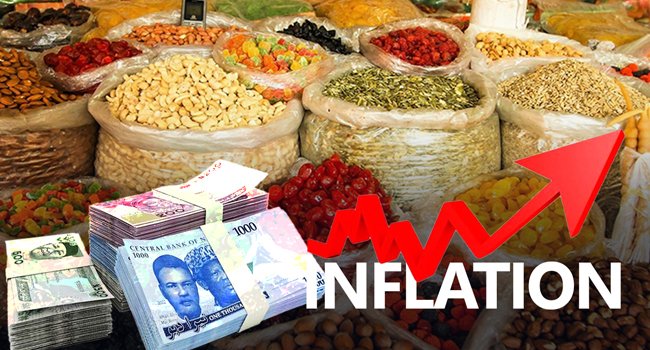The Yuletide season, traditionally a time for joy, family gatherings, and celebrations, has taken a somber tone this year as Nigeria’s economic hardships force citizens to make tough decisions. Soaring transportation fares, relentless hikes in food prices, and stagnant wages have dimmed the holiday spirit, pushing many to opt for a subdued Christmas.
Our correspondents, Juliet Jacob, Sultan Rabiu and Umar Dalhat Muaz, engage with Nigerians across the country to capture their stories of resilience and adaptation as they navigate this festive season amid unrelenting financial struggles.
Yuletide Season Blighted by Despair

The Yuletide season, marking the celebration of Christmas and New Year’s, has commenced in Nigeria, bringing with it a flurry of festivities, traditions, and cultural practices.
In Nigeria, the Yuletide season holds significant cultural and religious importance, with millions of Christians observing Christmas as a sacred holiday commemorating the birth of Jesus Christ.
The season is typically characterized by decorations, carol singing, gift exchanges, and family reunions, with many Nigerians traveling from cities to their hometowns to celebrate with loved ones.
Economic Hardship amidst Celebration

Nigeria is grappling with severe economic hardship, as rising inflation, unemployment, and poverty continue to afflict millions of citizens who are supposed to be in celebration mood as Christmas and the New Year knock on the door.
The country’s economy, heavily reliant on oil exports, has been battered by global market fluctuations, resulting in skyrocketing food and fuel prices that have left many Nigerians struggling to make ends meet.
Removal of Subsidies

President Bola Tinubu’s decision to abruptly remove fuel subsidies and float the Naira on his inauguration day has proven to be a devastating blow to Nigeria’s economy, leaving millions struggling to cope with the aftermath.
The move, widely criticized as ill-conceived, has led to soaring inflation rates, with food inflation exceeding 40% and over 80% of the population living in poverty.
The consequences of this policy have been severe, with Nigerians facing unprecedented economic hardship, sparking widespread protests and outrage across the country.

According to economic analysts, Nigeria’s inflation rate has soared to a 17-year high, while the unemployment rate has surpassed 33%, with youth unemployment reaching alarming levels.
As the economic downturn bites harder, many Nigerians are being forced to make difficult choices between basic necessities, sparking widespread concern about the country’s economic future.
General inflation and Food Inflation
As Nigerians celebrate the Yuletide season, the country’s soaring inflation rate has cast a gloomy shadow over the festivities, with many struggling to afford basic necessities.
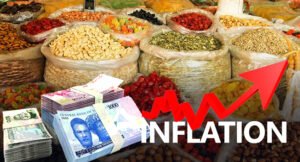
According to recent statistics by National Bureau of Statistics (NBS), Nigeria’s inflation rate has surged to 34.6%, with food inflation reaching a staggering 39.93%, a sharp increase from the previous month’s 32.84%.
The crippling inflation has left many Nigerians reeling, as the prices of staple foods, decorations, and other festive essentials have skyrocketed, making it difficult for people to enjoy the holiday season without breaking the bank.
Shadow of Gloom on Yuletide Season
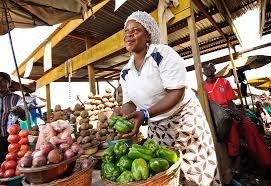
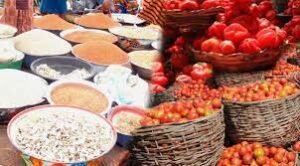
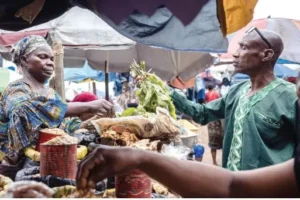
Nigeria’s poverty rate has cast a gloomy shadow over the Yuletide season, with an estimated 40.7% of the population living below the poverty line, according to World Bank projections.
The effects of high inflation, limited job creation, and limited access to services have been particularly felt during this festive period. Many Nigerians are struggling to afford basic necessities, let alone indulge in festive traditions.

An Abuja civil servant resident Mr. Isaac Akpan who is also a father of four spoke with our correspondent and painted a airfield picture of the current situation in the country.
“Yuletide season, typically a time of joy and celebration, has become a stark reminder of the country’s economic challenges”, Mr. Akpan said.
He added, “Limited job creation, with 3.5 million people entering the labour force each year, has left many without a steady income. Infrastructure gaps, including limited access to electricity, have further exacerbated the situation.
“To be honest with you, as Nigerians celebrate the holidays, many are forced to make difficult choices between basic necessities, highlighting the need for urgent action to address the country’s poverty crisis.”, he lamented.
Nigerians Navigates the Stormy Weather
Despite the economic hardship plaguing the country, Nigerians are still finding ways to prioritize celebrating the Yuletide season.

For many, the festive period is a time-honored tradition that brings joy, comfort, and a sense of community.
As a result, many Nigerians are digging deep into their pockets to afford the basics of celebration, from food and decorations to gifts and travel. However, the cost of celebrating Yuletide is taking a significant toll on already strained household budgets.
As Nigerians struggle to make ends meet, the pressure to maintain traditional Yuletide celebrations is leading many to take on debt, sell assets, or even go without essential necessities.
The long-term consequences of this financial strain are yet to be seen, but experts warn that the cumulative effect of repeated financial sacrifices could have far-reaching implications for the country’s economic recovery.
As the festive season reaches its peak, Nigerians are being forced to confront the difficult reality of celebrating Yuletide in a time of economic hardship.
Nigerians Feeling the Pinche
Nigerians are feeling the pinch, especially when it comes to food and grocery expenses, which have increased significantly for 76% of the population.
The average cost of celebrating Yuletide in Nigeria is substantial, with expenses including food, decorations, gifts, and travel.
These expenses are taking a toll on household budgets and savings, forcing many to make difficult choices. The increased prices of goods and services due to inflation are further exacerbating the situation, making it challenging for Nigerians to enjoy the festive season without breaking the bank.
Yuletide on a Shoestring
Many Nigerians are turning to creative and budget-friendly strategies to reduce expenses. DIY decorations, potluck meals, and homemade gifts are becoming increasingly popular, allowing families to still enjoy the festive season without going into debts.
Others are embracing alternative celebrations and traditions, such as virtual gatherings or community-based events, which are more affordable and environmentally friendly instead traveling home to make a reunion with family and friends as a result of exorb transport fares.
Technology is also playing a key role in reducing Yuletide expenses, with online shopping, digital invitations, and social media platforms helping to cut costs and make the festive season more accessible to all.
Emotional toll on Economic Hardship
Africa Health Report’s (AHR) findings show that many Nigerians are struggling to cope with the emotional toll of economic hardship since the removal of fuel subsidies by President Bola Tinubu last year.
According to Mrs. Nneoma Paul, a mother of three, “The pressure to provide for my family during Yuletide is overwhelming. I feel like I’m failing as a parent because I can’t afford to buy my children the gifts they want.”
Mr. Emmanuel Adeyemi, a businessman, echoed similar sentiments, stating, “The economic hardship has taken a toll on my mental health. I feel anxious and stressed about meeting the expectations of my family and friends during Yuletide.”
The pressure to maintain social appearances and traditions despite financial constraints is also taking a significant toll on Nigerians.
As noted by Dr. Folake Abiodun, an Abuja-based psychologist, “The societal pressure to celebrate Yuletide in a certain way can be debilitating.
“Many people feel like they need to keep up appearances, even if it means going into debt or sacrificing their mental health.”
The impact of Yuletide celebrations on mental health and well-being is a growing concern, with many Nigerians seeking support and counselling to cope with the emotional strain of the season.
Nigerians are being forced to confront the harsh realities of celebrating amidst economic hardship.
Revaluation of Priorities
In the face of soaring inflation, crippling poverty, and widespread financial strain, many are calling for a re-evaluation of priorities and a shift towards more sustainable and meaningful ways to celebrate Yuletide.
Dr Folake Abiodun counselled Nigerians to break the bank in the name of celebration. She gave advice that people should spend on necessities alone, rather than succumbing to societal pressure.
“Rather than succumbing to societal pressure and financial stress, Nigerians are being encouraged to rediscover the true spirit of the season, focusing on community, connection, and kindness, rather than conspicuous consumption and materialism.
“By doing so, Nigerians can work towards creating a more authentic, inclusive, and joyful Yuletide celebration that brings people together, rather than driving them further apart.”, Dr Abiodun concluded.
Conclusion
The joy of the Yuletide season is being dampened by economic realities, forcing many Nigerians to celebrate in more subdued ways. Despite these challenges, families are adapting, cherishing the little they can afford, and hoping for a brighter future.

